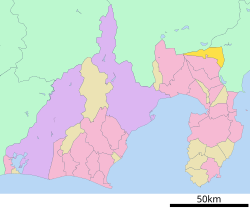Oyama, Shizuoka
|
Oyama 小山町 |
|||
|---|---|---|---|
| Town | |||

Oyama Town Hall
|
|||
|
|||
 Location of Oyama in Shizuoka Prefecture |
|||
| Coordinates: 35°21′36.3″N 138°59′14.2″E / 35.360083°N 138.987278°ECoordinates: 35°21′36.3″N 138°59′14.2″E / 35.360083°N 138.987278°E | |||
| Country | Japan | ||
| Region |
Chūbu Tōkai |
||
| Prefecture | Shizuoka Prefecture | ||
| District | Suntō | ||
| Area | |||
| • Total | 135.74 km2 (52.41 sq mi) | ||
| Population (September 2015) | |||
| • Total | 19,184 | ||
| • Density | 141/km2 (370/sq mi) | ||
| Time zone | Japan Standard Time (UTC+9) | ||
| Symbols | |||
| • Tree | Sakura | ||
| • Flower | Rapeseed | ||
| • Bird | Japanese bush-warbler | ||
| Phone number | 0550-76-1111 | ||
| Address | 57-2 Fujimagari, Oyama-chō, Suntō-gun, Shizuoka-ken 410-1395 | ||
| Website | Official website | ||
Oyama (小山町 Oyama-chō?) is a town located in Suntō District, Shizuoka Prefecture, Japan. As of June 2014, the town had an estimated population of 19,184 and a population density of 141 persons per km2. The total area is 135.74 square kilometres (52.41 sq mi).
Oyama is located in the far northeastern corner of Shizuoka Prefecture, bordering on Yamanashi and Kanagawa Prefectures. Located in between the Tanzawa Mountains and the foothills of Mount Fuji, the town has an average altitude of 800 meters, and has a cool climate with heavy rainfall. Some 65% of the town is covered in forest.
A small post town existed in this area since the Heian period, as Oyama is located at the base of the Ashigara Pass on the main route connecting the ancient provinces of Sagami with Kai and Suruga Provinces. The area was mostly tenryō territory under direct control of the Tokugawa shogunate in the Edo period. During the cadastral reform of the early Meiji period on April 1, 1889, the area was reorganized into the villages of Rokugo, Kannuma, Ashigara, Kitago and Subashiri within Suntō District, Shizuoka, two months after the opening of Suruga-Oyama Station on the Tōkaidō Main Line (now Gotemba Line).
...
Wikipedia



